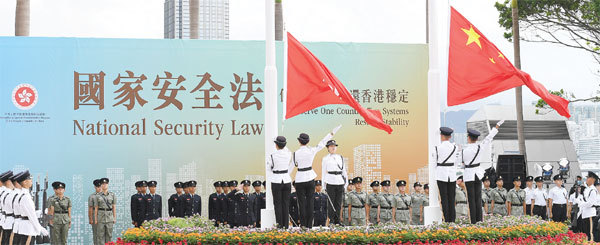
A flag-raising ceremony is held at Golden Bauhinia Square to celebrate the 23rd anniversary of Hong Kong's return to China on July 1, 2020. (Photo: China Daily)
2020 is a watershed for Hong Kong. With the enactment of the National Security Law, Hong Kong is leaving turmoil and restlessness behind. Some people complain that it has eroded Hong Kong's freedoms. Others say it brings peace and order back to Hong Kong. But I have no doubt that Hong Kong from 2021 on will head toward a brighter future.
The National Security Law certainly has taken away some freedoms, and that is indeed the intent of the law. But we do not want the freedom to challenge China's sovereignty over Hong Kong. The freedom to use violence, road blockages, vandalism, harassment, and intimidation to achieve political ends will only add suffering to the city. Such freedoms should not be tolerated. The city has tolerated such damage to the city for too long. It needs a new beginning.
The enactment of the National Security Law took the agitators by surprise, but they really should not be surprised, because they had gone much too far. The fact was that they forced Beijing's hand. What could they expect? Four of our elected legislators were disqualified for seeking sanctions on Hong Kong and its officials. But they are supposed to serve the interests of the Hong Kong SAR. What could they expect?
Some residents who do love Hong Kong are disappointed that Hong Kong is not going to have the kind of open elections that they sought, but they have forgotten that Beijing's promise of universal suffrage has always been conditional — with the requirement that candidates for the Chief Executive post must first be vetted by the nominating committee. This is clearly spelled out in Hong Kong's Basic Law and the wording is not ambiguous at all. The UK, Australia, and the US are hypocritical in being so draconian with their own national security laws and yet condemning China for introducing the National Security Law to the SAR, which is directly under China's sovereignty.
First and foremost among my New Year wishes must be that the current pandemic will disappear or at least come totally under control. COVID-19 has caused too much human suffering. COVID-19 is a wake-up call for us humans. Humans need to work together to fight our common enemies: pandemics and climate change on the outside, and prejudice and selfishness on the inside. In particular, the US and China need to work together rather than fighting each other.
My second New Year wish is that political reform will take off, with universal suffrage for election of the chief executive following the terms of Article 45, as laid out in the package offered by the SAR government in 2015. That proposal was rejected at the LegCo vote with "pan-democrat" camp legislators outnumbering pro-establishment camp legislators at the time because many of the latter had opted to leave the meeting chamber with the intent to delay the vote. Actually, that package was quite liberal, requiring nomination from only 10 percent of the nominating committee to pass the threshold to enter the race. These individuals can debate with other contenders publicly and the nominating committee will finally choose two to three among them to become official candidates for the public to vote on.
It was unfortunate that almost all of the opposition camp legislators resigned after four legislators were disqualified from serving on LegCo in the extended term of office. That was a political gesture to show their joint disapproval of the disqualifications. But the disqualifications are not arbitrary and a direct result of their act of inviting sanctions from the United States against the SAR. My third New Year wish is therefore that they will understand the severity of seeking sanctions from foreign powers. Any legislator who seeks sanctions from foreign powers performs an act of betrayal. The truth is that Beijing has been acting on good faith, and has never deviated from the spirit of the Basic Law as it was promulgated in 1990. The lie is that Beijing has reneged on its promises.
As a matter of fact, Hong Kong after the handover has gone a long way, and we should not lose heart. Major milestones include the launch of bank deposit insurance; the Mandatory Provident Fund Scheme; the much beefed-up Old Age Living Allowance; the launch of the HK$2 (26 US cents) public-transport fare for those aged 65 or higher (and the proposed extension to cover those 60 and over); the introduction of the minimum wage in Hong Kong; the expansion of university and postsecondary education opportunities; the introduction of the Pre-primary Education Voucher Scheme; various major infrastructure improvement projects to improve local transportation; the adoption of the Sponge City concept and Hong Kong's huge success in reducing floods; huge improvements in amenities throughout Hong Kong, including the harborfront promenades and new cycling trails; and a new children's hospital. In January 2019, our police force announced that Hong Kong recorded the lowest crime rate in 48 years in 2018.
Hong Kong is, of course, no perfect society. We still have hundreds of thousands of people living in substandard housing, and last week we learnt that Hong Kong's poverty rate had risen in 2019. The government's recurrent cash measures, however, lifted 392,900 people out of poverty. We need to hold together and work to secure a better future for our city.
The author is a senior counsel, law professor and criminal justice analyst, and was previously the director of public prosecutions of the Hong Kong SAR.


